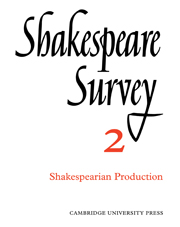Book contents
- Frontmatter
- Fifty Years of Shakespearian Production: 1898–1948
- An Original Drawing of the Globe Theatre
- The Projected Amphitheatre
- Ben Jonson and Julius Caesar
- The Booke of Sir Thomas More and its Problems
- The ‘Shakespearian’ Additions in The Booke of Sir Thomas More
- The Renaissance Background of Measure for Measure
- The Individualization of Shakespeare’s Characters through Imagery
- Trend of Shakespeare Scholarship
- Shakespeare in France: 1900–1948
- International News
- Shakespeare in New York: 1947–1948
- The Year's Contributions to Shakespearian Study 1 Critical Studies
- 2 Shakespeare’s Life and Times
- 3 Textual Studies
- Books Received
- Index
- Plate section
The Projected Amphitheatre
Published online by Cambridge University Press: 28 March 2007
- Frontmatter
- Fifty Years of Shakespearian Production: 1898–1948
- An Original Drawing of the Globe Theatre
- The Projected Amphitheatre
- Ben Jonson and Julius Caesar
- The Booke of Sir Thomas More and its Problems
- The ‘Shakespearian’ Additions in The Booke of Sir Thomas More
- The Renaissance Background of Measure for Measure
- The Individualization of Shakespeare’s Characters through Imagery
- Trend of Shakespeare Scholarship
- Shakespeare in France: 1900–1948
- International News
- Shakespeare in New York: 1947–1948
- The Year's Contributions to Shakespearian Study 1 Critical Studies
- 2 Shakespeare’s Life and Times
- 3 Textual Studies
- Books Received
- Index
- Plate section
Summary
Ever since Collier published his History of English Dramatic Poetry it has been known that under James I and Charles I attempts were made to establish an amphitheatre or arena for shows in or near London. It is curious that historians of the English stage have been content to quote the three letters printed by Collier, without seeking more light on this grandiose scheme, so characteristic of the period, first set on foot four years after Shakespeare’s death, and without studying the illuminating documents on the proposed amphitheatre first printed by ‘G.E.P.A.’ in Notes and Queries, 11th ser., x, 481, 502, December 1914.
What Collier printed was one letter (29 September 1620) from the King to the Privy Council, and two others (12 August and 18 September 1626), from Lord Coventry to Lord Conway. By the first letter, James says that three of his servants, Cotton, Williams, and Dixon, have been licensed under his signet to build an amphitheatre. Yet since certain provisions gave them too much latitude, he instructs his councillors to cancel the grant, and to have a new one drawn according to accompanying instructions. These instructions Collier did not find. The two letters from Lord Coventry, a year after the accession of Charles, showed not only that the Jacobean grant never passed the great seal, but that by the new licence Williams and Dixon (Cotton having dropped out) were to be allowed greater monopolistic power over theatrical London. As Lord Coventry notes, the first project
was intended principally for Martiall exercises and extraordinary shews and solemnyties for Ambassadors and persons of honour and quality, with a Cessation from other shews and sports for one daie in a Moneth onlie, upon 14 daies warning; wheras by this new graunt, I see little probability of any thing to be used, but common plaies or ordinary sports now used or shewed at the Beare-garden, or the common playhouses aboutes London, for all sorts of Beholders, with a restraynt to all other playes and shewes for one day in the weeke upon two daies warning: with liberty to erect their Buildings in Lincolns Inne fields, where there are too many buildings already....
Conway's endorsement on this reads: "That it is unfit the grant for the Amphitheater should passe.
- Type
- Chapter
- Information
- Shakespeare Survey , pp. 24 - 35Publisher: Cambridge University PressPrint publication year: 1949



